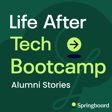
Policy Escalations Specialist to UX Writer
This week, we're chatting with Natalia, who studied UX/UI design and currently works as a UX Copywriter at Amazon Music, having previously worked at Cisco and CVS. Before transitioning to copywriting, she held the role of Policy Escalations Specialist at TikTok.
If you're curious about avoiding a "cookie-cutter" portfolio, Natalia offers valuable insights into how she tailored her case studies to appeal to UX writing roles and the strategies she employed to make her portfolio distinctive. She also delves into her extensive experience in UX writing and its integration within the broader UX profession.
Questions for Natalia or the host? Email the host at alumnipodcast@springboard.com.
Interested in finally taking the plunge by starting your career in tech? How does $1500 off a Springboard Career Track Course sound?
Use code EPEHT at checkout to save $1500.
Learn more here.
